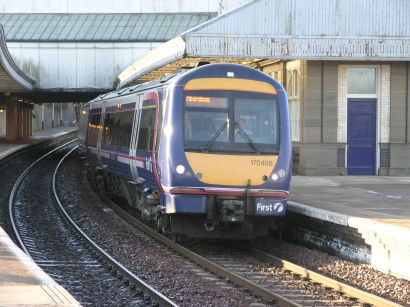NEW PROPOSALS for ScotRail after the present franchise expires in 2014 include suggestions that trains from England should not travel further north than Edinburgh, and that alcohol should be banned on all trains. Some fares could rise, while sleeper services are also set to be reduced and possibly run by a separate franchise.
These and other ideas are set out in a consultation paper issued by Transport Scotland – the broad equivalent of the Westminster-based Department for Transport north of the border.
The Scottish Government is concerned about the proportion of railway income which comes from farepayers, some 26 per cent, and is examining ways of reducing the proportion of public funding which has to make up the balance.
The foreword, which is signed jointly by infrastructure and investment secretary Alex Neil and transport minister Keith Brown, says: 'Our ambition is to have a railway that offers value for money, ensures that the railway industry acts in a coordinated, integrated manner, and, most importantly, has passenger interests at its heart.'
Some of the ideas which follow are radical. Transport Scotland is concerned that trains from south of the border which continue to Aberdeen or Inverness are 'frequently considerably underutilised', and that their existence also reduces ScotRail's income.
As a result, all trains arriving from England via the East Coast Main Line could terminate at Edinburgh, which would become a 'rail hub' for onward travel.
Fare levels in general are in the melting pot, and as part of the changes regulated intercity fares could be scrapped. Transport Scotland suggests that the market on intercity routes is self-regulating because competition from other transport modes, particularly cars, provides its own restraint.
Although the report says Transport Scotland does not intend to reduce the size of the network or close stations, it goes on to point out that 16 of the country's 350 stations handle fewer than 500 passengers a year. It also questions whether multiple stations are needed in areas where they are less than 1500m apart, saying: 'We would welcome views on what locations may be more appropriate for stations and which current stations are no longer required'.
Sleepers, which have been a target for reform more than once in the past 20 years, are once again under critical scrutiny. The report says they cost £21 million a year to provide, and goes on to question whether the present service pattern is still necessary.
It considers the reduction or abolition of subsidies, but also speculates about the possibility of private sector investment in the sleeper fleet to bring it up to modern standards. Such an upgrade could include en suite facilities, but these would reduce the number of berths in each vehicle and also present 'technical challenges in power and water supply'.
The provision of sleepers could be separated from the main ScotRail franchise, and become a specialist operation, but even the main franchise could also be divided to some extent between commercial and subsidised services.
However, some form of franchise or franchises does appear to be inevitable, at least in the shorter term. The report concludes that United Kingdom law would not permit the Scottish Government to adopt a direct form of state control, but a management contract is not ruled out.
Such a contract could be similar to the concessions which have been awarded in various parts of England, mostly for light rail services, in which the operator provides a specified level of services in return for mainly fixed fees, with little commercial risk.
One further suggested reform seems likely to spark a lively debate, because a complete ban on alcohol on board Scottish trains could be part of the new regime from 2014.
The report has been published for consulation, and Transport Scotland is inviting responses to its proposals no later than 20 February.


